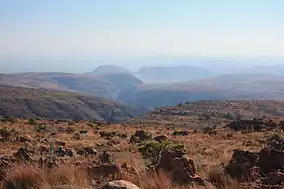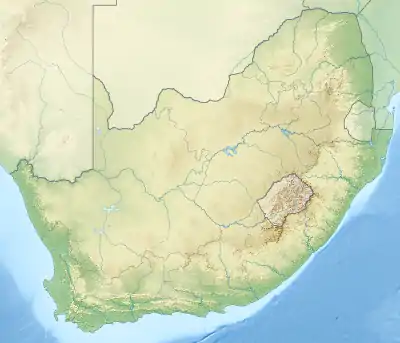Marakele National Park
Marakele National Park is a National Park that is part of the Waterberg Biosphere in Limpopo Province, South Africa.
| Marakele National Park | |
|---|---|
 View of the Waterberg massif, Marakele National Park | |
 Location of the park | |
| Location | Limpopo, South Africa |
| Nearest city | Thabazimbi |
| Coordinates | 24°53′S 27°49′E |
| Area | 670 km2 (260 sq mi) |
| Established | 1994 |
| Governing body | South African National Parks |
| www | |
Flora and fauna
The park is accessible to all passenger vehicles, with the camp and tent sites on good roads. Also, approximately 80 km of roads within the park are accessible to all vehicles, the balance requiring a four-wheel drive vehicle. Marakele is home to the big five (buffalo did not exist in the park, but 20 disease-free buffalo (nine cows and eleven bulls) were re-introduced on 15 October 2013) [1] as well as sixteen species of antelopes and over 250 species of birds, including the largest colony of Cape griffon vultures in the world (around 800 breeding pairs). The Matlabas River runs through the park.
History
The area now constituting Marakele was home to several iron-age settlements which are not yet open to public viewing. Previous to its foundation as a National Park, it was home to naturalist Eugene Marais. Marakele was founded as Kransberg National Park in 1994 with the purchase of 150 square kilometres (58 sq mi), and was shortly after renamed to its current name. By 1999, the park had expanded to 670 square kilometres (260 sq mi).
Accommodation
Two tented camps are laid on in Marakele, namely Tlopi and Bontle. The SANParks webpage informs that between April and September 2013, eight new tented units will be constructed at Bontle camp, but that the camping sites will be kept open for visitors.
References
- "Disease free buffalos re-introduced in Marakele National Park". www.sanparks.org. SANParks. 16 October 2013. Retrieved 19 November 2020.
External links
| Wikimedia Commons has media related to Marakele National Park. |
| |||||||||||||||||||||||||||
| |||||||||||||||||||||||||||
| |||||||||||||||||||||||||||
| |||||||||||||||||||||||||||
| |||||||||||||||||||||||||||
| |||||||||||||||||||||||||||
| |||||||||||||||||||||||||||
| |||||||||||||||||||||||||||
| Authority control |
|
|---|